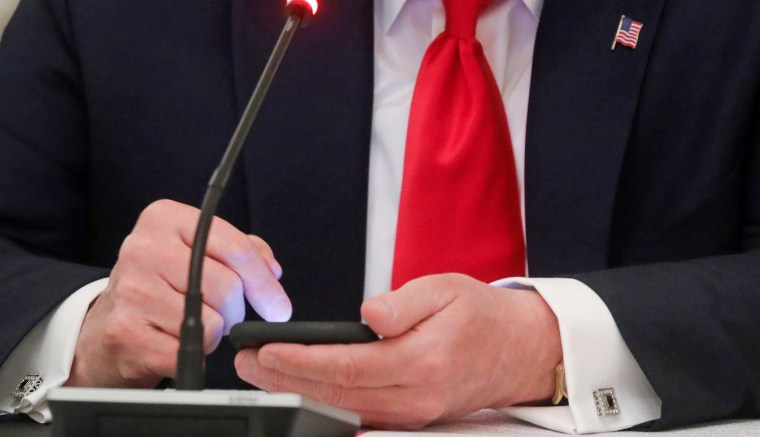It was just last week when the White House drew a strange line in the sand: Donald Trump was prepared to veto the National Defense Authorization Act (NDAA) -- a massive, annual defense spending bill -- unless lawmakers agreed to protect the names of bases that honor Confederate leaders.
The good news is, the president appears to be moving away from his pro-Confederate ultimatum. The bad news is, the Republican has come up with a new ultimatum.
President Donald Trump is threatening to veto a defense policy bill unless it ends protections for internet companies that shield them from being held liable for material posted by their users. On Twitter Tuesday night, Trump took aim at Section 230 of the 1996 Communications Decency Act, which protects companies that can host trillions of messages from being sued into oblivion by anyone who feels wronged by something someone else has posted — whether their complaint is legitimate or not.
Condemning the telecommunications policy as "very dangerous & unfair," the outgoing president wrote that he will "unequivocally VETO" the defense spending package until the provision of the law is "completely terminated."
To be sure, Trump has whined about Section 230 of the 1996 Communications Decency Act plenty of times before, but this new threat clearly represents an escalation.
It's also quite dumb. The president has long been convinced that tech giants such as Twitter, Facebook, and Google have secretly conspired to undermine him and his party. Like Trump's other conspiracy theories, he's never been able to substantiate the claims or produce any meaningful evidence, but true to form, the Republican has convinced himself that nefarious enemies are out to get him -- even if others can't see it.
Nevertheless, the president now expects lawmakers to "completely terminate" Section 230, or he will reject the NDAA. What do liability protections for internet companies have to do with a U.S. military package? Nothing, but Twitter keeps telling people that Trump's anti-election missives aren't true, and this appears to be the manifestation of the president's frustrations.
Indeed, from his perspective, Trump seems to think he has some leverage: Democrats and Republicans both want the NDAA to pass, so he apparently believes they'll give in to his demands, and he can exact revenge on those rascally tech companies.
He should probably start lowering his expectations. For one thing, while there may be room for reforming Section 230 at some point, "completely terminating" the policy is foolish, especially in response to made-up industry biases that exist only in conservatives' imaginations. For another, there's no reason to believe lawmakers will simply add this to the NDAA -- without scrutiny, hearings, or concern for the consequences -- as a way of dealing with the latest presidential tantrum. A Politico report added:
"It's a f***ing joke," said the staffer, who spoke anonymously to discuss private negotiations. "This is a complex debate that has no business as an eleventh-hour airdrop." The senior staffer said the push to include other proposals targeting Section 230, even a bipartisan bill led by Senate Majority Whip John Thune (R-S.D.), in the defense bill won't make it either. "Full stop," the staffer said.
In case this isn't obvious, the annual NDAA is more than just a spending package. As NBC News' report noted, the measure "guides Pentagon policy and cementing decisions about troop levels, new weapons systems and military readiness, military personnel policy and other military goals." The package, which has passed every year for six decades with bipartisan backing, also includes a pay raise for U.S. troops.
Trump is willing to veto it anyway, apparently because some tech companies have interfered with his lying.
Ideally, Congress could pass the NDAA anyway -- competing versions cleared the House and Senate by veto-proof majorities -- but would scared congressional Republicans have the courage to override a Trump veto on his way out of office. I doubt it.
Either way, the president has left himself in a strategically bad position: he'll either derail an important and bipartisan military bill for a dumb reason, or he'll sheepishly retreat as one of his last acts in his failed term.

